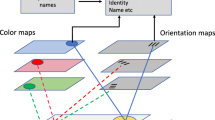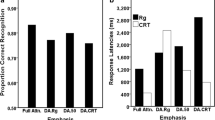Abstract
Functional classes, formed by the partition of a set of stimuli, can be expanded by the direct training of new stimuli. Unknown, however, is whether new stimuli can be added to classes through indirect training procedures. The present study investigated whether functional classes can be expanded with the inclusion of new stimuli from exclusion procedures. In Study 1, 20 undergraduate students and 20 children learned three simple visual simultaneous discriminations. After successive reversals of the stimulus functions, an exclusion test was conducted with two new stimuli, followed by three class expansion tests, with the presentation of the pair of new stimuli and reversals of the stimulus functions. One third of the two groups exhibited performance by exclusion. Most of the students attributed the new stimuli to the classes in a way that was unrelated to their performance in the exclusion test. The children responded irregularly to the new stimuli in the class expansion tests. In Study 2, an exclusion test was added to the procedure, prior to the successive reversals. The participants, seven undergraduate students, responded by exclusion in the first test, but only three did so in the second test. Participants who responded by exclusion in the second test exhibited expansion of the classes, including the new stimuli into the classes. Successive reversal procedures interfere with the stability of the function of the stimuli in the class, which hinders the performance of participants in exclusion probes. We discuss the implications of studying the expansion of functional classes.



Similar content being viewed by others
Data Availability
Data are available in Supplementary Material.
References
Antoniazzi, M., Domeniconi, C., & Schmidt, A. (2014). Efeito da pré-exposição ao objeto no desempenho por exclusão e na aprendizagem da relação nome-objeto [Effect of object pre-exposure on exclusion performance and name-object relation learning]. Acta Comportamentalia, 22(1), 23–36.
Aust, U., Range, F., Steurer, M., & Huber, L. (2008). Inferential reasoning by exclusion in pigeons, dogs, and humans. Animal Cognition, 11, 587–597. https://doi.org/10.1007/s10071-008-0149-0.
Barros, R. S., Souza, C. B. A., & Costa, T. D. (2013). Functional class formation in the context of a foraging task in capuchin monkeys. Journal of the Experimental Analysis of Behavior, 100, 79–87. https://doi.org/10.1002/jeab.27.
Bortoloti, R., & de Rose, J. C. (2014). Relações de equivalência como modelo de relações semânticas. In J. C. de Rose, M. S. C. A. Gil, & D. G. de Souza (Eds.), Comportamento simbólico: Bases conceituais e empíricas [Symbolic behavior: Conceptual and empirical bases](pp. 149–176) Cultura Acadêmica.
Canovas, D. S., de Souza, D. D. G., & Barros, R. S. (2013). Simple successive discrimination and functional class formation in preschool children. The Psychological Record, 63, 525–544. https://doi.org/10.11133/j.tpr.2013.63.3.009.
Costa, A. R. A., Grisante, P. C., Domeniconi, C., de Rose, J. C. C., & de Souza, D. D. G. (2013). Naming new stimuli after selection by exclusion. Paidéia, 23(55), 217–224. https://doi.org/10.1590/1982-43272355201309.
Costa, A. R. A., Wilkinson, K. M., McIlvane, W. J., & de Souza, D. D. G. (2001). Emergent word-object mapping by children: Further studies using the blank comparison technique. The Psychological Record, 51, 343–355. https://doi.org/10.1007/BF03395403.
Cumming, W. W., & Berryman, R. (1965). The complexdiscriminated operant: Studies of matching tosample and related problems. In: D. I. Mostofski(Ed.), Stimulus generalization (pp. 284–329).Stanford, CA: Stanford University Press.
de Rose, J. C. (1993). Classes de estímulos: implicações para uma análise comportamental da cognição. Psicologia: Teoria e Pesquisa, 9(2), 283–303.
de Rose, J. C., de Souza, D. G., & Hanna, E. S. (1996). Teaching reading and spelling: Exclusion and stimulus equivalence. Journal of Applied Behavior Analysis, 29(4), 451–469. https://doi.org/10.1901/jaba.1996.29-451.
Dixon, L. S. (1977). The nature of control by spoken words over visual stimulus selection. Journal of the Experimental Analysis of Behavior, 27(3), 433–442. https://doi.org/10.1901/jeab.1977.27-433.
Fields, L., Newman, S., Adams, B. J., & Verhave, T. (1992). The expansion of equivalence classes through simple discrimination training and fading. The Psychological Record, 42(1), 3–15. https://doi.org/10.1007/BF03399583.
Horne, P. J., & Lowe, C. F. (1997). Toward a theory of verbal behavior. Journal of the Experimental Analysis of Behavior, 68, 271–296. https://doi.org/10.1901/jeab.1997.68-271.
Horst, J. S., & Hout, M. C. (2016). The Novel Object and Unusual Name (NOUN) Database: A collection of novel images for use in experimental research. Behavior Research Methods, 48(4), 1393–1409. https://doi.org/10.3758/s13428-015-0647-3.
Hosokawa, T., Honda, Y., Yamada, M., Romero, M. C, Iijima, T., & Tsutsui, K. I. (2018). Behavioral evidence for the use of functional categories during group reversal task performance in monkeys. Scientific Reports, 8(1), 1–9. https://doi.org/10.1038/s41598-018-33349-3
Kastak, C. R., & Schusterman, R. J. (2002). Sea lions and equivalence: Expanding classes by exclusion. Journal of the Experimental Analysis of Behavior, 78, 449–465. https://doi.org/10.1901/jeab.2002.78-449.
Kastak, C. R., Schusterman, R. J., & Kastak, D. (2001). Equivalence classification by California sea lions using class-specific reinforcers. Journal of the Experimental Analysis of Behavior, 76, 131–158. https://doi.org/10.1901/jeab.2001.76-131.
Langsdorff, L. C., Domeniconi, C., Schmidt, A., Gomes, C. G., & de Souza, D. D. G. (2017). Learning by exclusion in individuals with autism and Down syndrome. Psicologia: Reflexão e Crítica, 30, 1–10. https://doi.org/10.1186/s41155-017-0064-x.
Lionello DeNolf, K. M., Canovas, D. S., de Souza, D. D. G., Barros, R. S., & McIlvane, W. J. (2008). Reversal learning set and contingency class formation in children with and without autism. The Psychological Record, 58, 15–36. https://doi.org/10.1007/BF03395600.
McIlvane, W. J. (1992). Stimulus control analysis and nonverbal instructional methods for people with intellectual disabilities. In N. W. Bray (Ed.), International review of research in mental retardation (Vol. 18; pp. 55–109). Academic Press. https://doi.org/10.1016/S0074-7750(08)60116-0
McIlvane, W. J., Kledaras, J. B., Munson, L. C., King, K. A., Rose, J. C. D., & Stoddard, L. T. (1987). Controlling relations in conditional discrimination and matching by exclusion. Journal of the Experimental Analysis of Behavior, 48(2), 187–208. https://doi.org/10.1901/jeab.1987.48-187.
Plazas, E. A., & Villamil, C. W. (2018). Formation of new stimulus equivalence classes by exclusion. Journal of the Experimental Analysis of Behavior, 109(2), 380–393. https://doi.org/10.1002/jeab.322.
Postalli, L. M. M., Canovas, D. S., & de Souza, D. D. G. (2015). Simple discrimination and reversal learning sets in typically developing young children. The Psychological Record, 65, 411–423. https://doi.org/10.1007/s40732-015-0116-5.
Ribeiro, T. A., Gallano, T. P., Souza, D. H., & de Souza, D. D. G. (2017). Responding and learning by exclusion in 2-year-olds: The case of adjectives. The Psychological Record, 67, 293–314. https://doi.org/10.1007/s40732-016-0213-0.
Saunders, R. R., Drake, K. M., & Spradlin, J. E. (1999). Equivalence class establishment, expansion, and modification in preschool children. Journal of the Experimental Analysis of Behavior, 71, 195–214. https://doi.org/10.1901/jeab.1999.71-195.
Saunders, R. R., & Green, G. (1992). The nonequivalence of behavioral and mathematical equivalence. Journal of the Experimental Analysis of Behavior, 57, 227–241. https://doi.org/10.1901/jeab.1992.57-227.
Saunders, R. R., Saunders, K. J., Kirby, K. C., & Spradlin, J. E. (1988). The merger and development of equivalence classes by unreinforced conditional selection of comparison stimuli. Journal of the Experimental Analysis of Behavior, 50, 145–162. https://doi.org/10.1901/jeab.1988.50-145.
Schenk, J. J., Keenan, M., Boelens, H. H., Dymond, S., & Smeets, P. M. (2021). Children's emergent relations of equivalence using stimuli with opposite verbal labels: Exclusion and minimal training conditions. Behavioural Processes, 185, 104341. https://doi.org/10.1016/j.beproc.2021.104341.
Schmidt, A., Franco, M. G. O., Lotério, L. S., & Gomes, G. F. (2016). Learning name-object relations after a single exclusion trial in 18-to 48-month-old children. The Psychological Record, 66, 53–63. https://doi.org/10.1007/s40732-015-0151-2.
Sidman, M. (1994). Equivalence relations and behavior: A research history. Authors Cooperative.
Sidman, M., Wynne, C. K., Maguire, R. W., & Barnes, T. (1989). Functional classes and equivalence relations. Journal of the Experimental Analysis of Behavior, 52, 261–274. https://doi.org/10.1901/jeab.1989.52-261.
Souza, M. F., & Schmidt, A. (2014). Responding by exclusion in Wistar rats in a simultaneous visual discrimination task. Journal of the Experimental Analysis of Behavior, 102, 346–352. https://doi.org/10.1002/jeab.106.
Stromer, R. (1986). Control by exclusion in arbitrary matching-to-sample. Analysis & Intervention in Developmental Disabilities, 6(1–2), 59–72. https://doi.org/10.1016/0270-4684(86)90006-6.
Urcuioli, P. J. (2013). Stimulus control and stimulus class formation. In G. J. Madden, W. V. Dube, T. D. Hackenberg, G. P. Hanley, & K. A. Lattal (Eds.), APA Handbooks in Psychology. APA handbook of behavior analysis (Vol. 1; pp. 361–386). American Psychological Association. https://doi.org/10.1037/13937-016.
Vaughan, W. (1988). Formation of equivalence sets in pigeons. Journal of Experimental Psychology: Animal Behavior Processes, 14(1), 36–42. https://doi.org/10.1037/0097-7403.14.1.36.
Wilkinson, K. M., Dube, W. V., & McIlvane, W. J. (1998). Fast mapping and exclusion (emergent matching) in developmental language, behavior analysis, and animal cognition research. The Psychological Record, 48, 407–422. https://doi.org/10.1007/BF03395281.
Wilkinson, K. M., & McIlvane, W. J. (1997). Blank comparison analysis of emergent symbolic mapping by young children. Journal of Experimental Child Psychology, 67(2), 115–130. https://doi.org/10.1006/jecp.1997.2402.
Wilkinson, K. M., McIlvane, W. J., & de Souza, D. D. G. (2000). As origens da exclusão [The origins of exclusion]. Temas em Psicologia, 8(2), 195–203.
Zaine, I., Domeniconi, C., & de Rose, J. C. (2016). Exclusion performance and learning by exclusion in dogs. Journal of the Experimental Analysis of Behavior, 105, 362–374. https://doi.org/10.1002/jeab.209.
Zentall, T. R., Galizio, M., & Critchfield, T. S. (2002). Categorization, concept learning, and behavior analysis: An introduction. Journal of the Experimental Analysis of Behavior, 78, 237–248. https://doi.org/10.1901/jeab.2002.78-237.
Author information
Authors and Affiliations
Corresponding author
Ethics declarations
Conflicts of Interest
The authors have no relevant financial or non-financial interests to disclose.
Ethical Standards
The authors declare that the treatment of the participants was carried out in accordance with the international ethical standards. The study was approved by the Brazilian ethical review bodies before its realization (CAAE 89585318.1.0000.5407 authorization). The participants (or their parents, if they were children) signed the informed consent form.
Additional information
Publisher’s Note
Springer Nature remains neutral with regard to jurisdictional claims in published maps and institutional affiliations.
This research is part of scientific program of the National Institute of Science and Technology on Behavior, Cognition, and Teaching (INCT-ECCE), supported by the National Council for Scientific and Technological Development (CNPq, grant # 465686/2014-1) and the São Paulo Research Foundation (FAPESP, grant #2014/50909-8). The first author has received scientific initiation scholarship from São Paulo Research Foundation (FAPESP, grant #2018/17735-7)
Supplementary Information
ESM 1
(DOCX 35 kb)
Rights and permissions
About this article
Cite this article
Ueno, L.S., Barbosa Junior, M. & Schmidt, A. Performance by Exclusion and Expansion of Functional Classes. Psychol Rec 72, 207–220 (2022). https://doi.org/10.1007/s40732-021-00484-9
Accepted:
Published:
Issue Date:
DOI: https://doi.org/10.1007/s40732-021-00484-9




